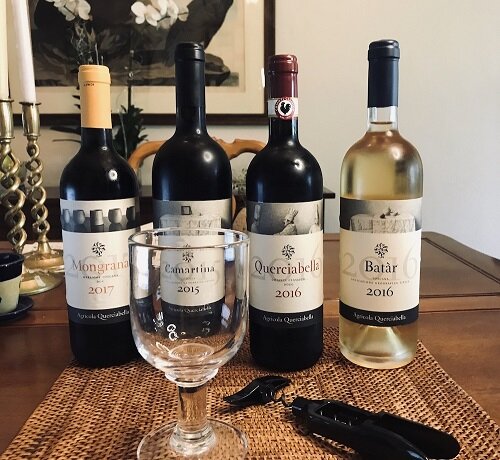Is Wine Vegan?
Editor’s note: It’s Veganuary, so we turned to Ellen Kanner to explain how wines can be made suitable for vegans and why they might be appealing to non-vegans as well.
Vegan Wines
Wine is made from grapes. Grapes come from vines. Vines are plants. Plants are vegan. Ergo; wine is vegan. You’d think. But for wine to be vegan, it’s not just about what’s in the bottle, it’s about how it got there. Winemakers wax poetic about terroir — the quality of the soil, the water, the unique sense of place that goes into creating the wine in your glass. They talk less about what’s actually in the soil and water, and it may be animals. In much commercial wine production, the vines are fertilized with fish emulsion, bone meal and/or manure. Or there may be unintended manure runoff from a neighboring farm. This may make for a plush pinot, but cow poop and other animal inputs are problematic for some plant-based eaters.
Then comes the actual winemaking process. After fermentation comes fining (aka refining or clarifying). You don’t want tannic grape seeds or grape skins floating in your glass, and cloudy wine isn’t cool, either. Fining adds clarity and stability to wine. Traditional filtering methods include the use of egg whites, isinglass a gelatin made from sturgeon bladder, chitin made from crustacean shells, or casein a form of milk protein, or cow’s or pig’s hoof gelatin. All told, up to 300 other additives, including rBGH growth hormones, GMOS, and antibiotics may be in your wine.
So how do you know what you’re buying or drinking? You don’t. Wineries aren’t required to list the ingredients in their products, despite the fact wine critics including Jancis Robinson have spent years urging transparency within the industry. Barnivore, an online database of vegan wines and spirits provides some guidance, but it’s crowd-sourced, and Barnivore doesn’t claim to verify all listings are vegan. For that, you might want to go to the online wine club Vegan Wines.
Frances Gonzalez
When CEO Frances Gonzalez started this curated plant-based wine club in 2017, “I would get ‘the look,’ you know? People would say, vegan wines can’t taste good.” Sebastiano Cossia Castiglioni of Querciabella also knows the skepticism. “Tradition is strong in our area,” he says, so when the longtime vegan converted his family’s Tuscan winery to plant-based biodynamic viticulture and viniculture in 2010, there was, he says, “skepticism.” Querciabella uses green manure — growing rows of legumes, seeds, and greens between the vines — to nourish the soil, and with it, the grapes that grow there. “Twenty years ago, nobody understood what veganism was. But the original apprehension started to disappear once people realized our wines didn’t suffer from our revolutionary approach. On the contrary, the wines noticeably improved.”
With Querciabella and other Vegan Wines selections getting top ratings from Robert Parker and Wine Spectator, winemakers are no longer sneering at the idea of vegan wine production, “they’re grasping it,” says Gonzalez. “I would say 70% have shifted or finally are interested to disclose their wine is vegan because they now see the demand.” They’re making the switch not because they love vegans but because they want to sell wine. Thanks to celebs like Cameron Diaz, clean wine is trending, with more wine patrons wanting to know what’s in their bottle. But for smaller wine producers, vegan wine isn’t just about being business savvy, it’s about survival.
Like all growers, winemakers are seeing the unsettling effects of climate change. “The wine industry is suffering. In Chile, wine producers are moving south, there were the Oregon fires. To stay in business, they have to make changes,” says Gonzalez. Staying with the same old-same old production methods “costs more,” she says. “You can produce more, but you’re diluting it with other things — horrible, expensive ingredients.”
Not every vegan wine wears a halo. Many California and Oregon wineries tend towards mass production and overprocessing according to Gonzalez, a member of Women of the Vine & Spirits, and she can taste the difference. “You can taste the alcohol, feel it burning, not in a good way.” Adds Gonzalez, “To be Vegan Wines-worthy, “less is more is what I look for. The vineyards where they use green manure, cover crops, less fertilizing. The vines work best when they’re stressed.”
Vegan Wines selections skew heavily towards Italy, France, Spain, and Chile, regions with a long winemaking tradition. “They’re starting to step up,” or rather, step back, returning to age-old organic and natural winemaking methods with minimal processing. Querciabella skips the fining process in favor of longer cellaring prior to release. It takes more time and patience, but Castiglioni believes it bears out in the quality and character of the wine. Other wineries use neutral plant-based fining agents like bentonite clay or even potatoes. “Viniculture should not be seen as separate from viticulture to craft true high-quality vegan wines,” says Castiglioni. Querciabella’s so-called revolutionary winemaking “starts from the ground up, which means the soil,” he says. “Through our vegan biodynamic practices, we emphasize the connection between the vine and our natural surroundings and strive to increase biodiversity in the vineyards which of course will benefit the environment. The health of the soil dictates the health of the vines and the quality of the grapes.”
Whether the motivation is surviving climate change, love of animals, celeb trends, good business practice, or quality in a glass, making vegan wine usually yields the same result, says Gonzalez: “Better wine.”


